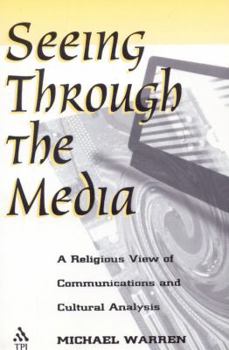Seeing Through the Media
Select Format
Select Condition 
Book Overview
Teachers, parents, religious leaders and others who are concerned with the dangers of cultural colonization will find in this book strategies to counteract the Christian church's loss of cultural influence in our age of electronic media.
Format:Paperback
Language:English
ISBN:1563382113
ISBN13:9781563382116
Release Date:November 1997
Publisher:Trinity Press International
Length:224 Pages
Weight:0.60 lbs.
Dimensions:0.6" x 5.6" x 8.5"
Customer Reviews
2 ratings
The medium and the message
Published by Thriftbooks.com User , 19 years ago
Michael Warren identifies many aspects of cultural awareness that need to be taken into account for modern society. For one thing, many people today are culturally passive, in that they permit things to be 'done' rather than doing things (this is often reflected in church, where the minister is expected to 'do' ministry to and for the people, who sometimes only engage in song and responsive prayer, and not always at that enthusiastically). He worries that this level of non-engagement leaves people open to manipulation. Another concern for Warren is that there are too many images - we don't engage images with depth (such as Henri Nouwen did with the Rembrandt painting). The television generation has grown steadily less and less attentive to static images, expecting change rapidly, but at the same time becoming desensitised to the whole enterprise. Single-shot camera on a set gave way to the three-camera approach for television production, then multiple shots and pans, until the MTV generation now expects a perspective shot change on screen at least once every 20 seconds! Warren states, 'the production, mass reproduction and accessibility of visual material seem to be eroding the capacity of many people to gain perspective on their social world.' It isn't only the violent crimes and sexual images that media viewers are becoming less sensitive to, but everything they see. Warren also looks at the concepts of selected tradition and the structure of feeling. These are constructionist ideas, looking at how culture can be deliberately shaped and formed, or even unconsciously but definitively directed in certain ways by the handing-down of systems of symbols and paradigms of interpretation. The kind of film and media that Warren would probably like for young persons to see involve things with depth, with commentary, with meaning beyond simple titillation and imagery that shocks and excites. Warren later in the book looks at issues of metaphor, iconic imagery and modern society's method of making sense of imagery. He mentions Baudrillard's idea of simulation - in a sense, most films and television are a simulation of a simulation: the film itself is a simulation of a sort, and the characters and environment depicted are also a simulation of certain relationships and aspects that the world should, in the eyes of the community at large, take on even if it never really achieves the fullness (and indeed, would be unlikely to like the results if it should). This taps into the concept of hegemony Warren draws from Gramsci and Williams. Warren uses the terminology and methodology of social science to drive his point about the problems and pitfalls of modern communication, but also offers hope that there are ways to bring communication into a fuller, more productive expression in the deeper spiritual sense.
Christianity and Cultural Studies
Published by Thriftbooks.com User , 22 years ago
In my experience, I have found very few self-avowed Christian writers who interact with cultural studies theory using its terminology and concepts. Warren attempts this in his text and for the most part, I believe he succeeds. He leaps off from Stuart Hall's notions about commodities, production, and hegemony to challenge religious people to consider how they interact with their culture. Although the title would suggest that Warren's analysis is limited to media, he also deals with the related areas of image interpretation and advertising to move people to think about the hegemonic structures of culture in which they live. The only shortfall of the book was the chapter on metaphor. Although this is an important topic in and of itself, I didn't think that it fit with the overall subject matter of Warren's text.






